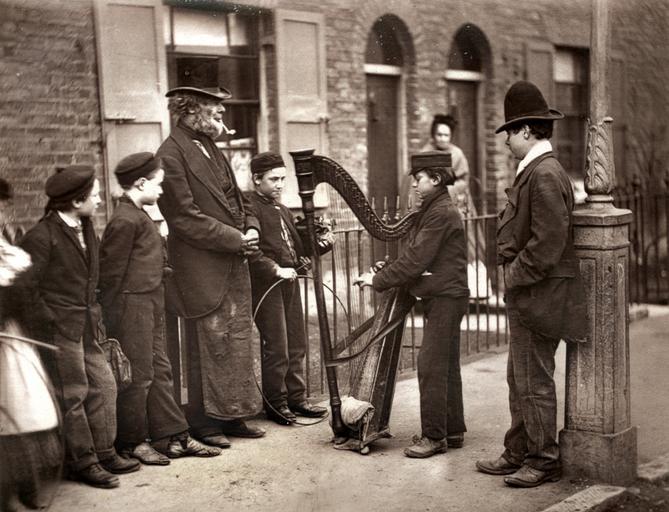MAKE A MEME
View Large Image

| View Original: | Italian_Street_Musicians.jpg (2708x2073) | |||
| Download: | Original | Medium | Small | Thumb |
| Courtesy of: | www.flickr.com | More Like This | ||
| Keywords: lse london school of economics londonschoolofeconomics musicians harp street_life_in_london streetlifeinlondon street performers streetperformers italian italians italiani a londra italianialondra monochrome From 'Street Life in London', 1877, by John Thomson and Adolphe Smith: "Then there is something irresistible in the bright glitter of his eyes, in. his cheerful gait, and his fascinating manners; While English mendicant is coarse, ungainly, dirty, rude of speech, unartist-like in his appearance, out of tune when he sings, vulgar in all his deeds, and often bears the stamp of a hopeless drunkard. This perhaps explains how it is that Italians, sons of peasants, agricultural labourers, and others who might lead respectable lives in their own country, prefer to come over to England where they are sometimes treated as mere beggars. They find that a beggar in England is richer than a labourer in Italy; and if he be not equally prosperous it is because he is not equally abstemious and economical. The Italian, therefore, migrates with the knowledge that he may rely on the generosity of the English, and that, if he only receives as much as many of the English poor, he may hope to save enough to buy himself a farm in his own country. They arrive, therefore, in shoals, and seeing how their presence is appreciated, do not realize the somewhat humiliating character of their avocation. Many, on the contrary, proudly claim a right to be ranked above the mendicant class. They urge, and to a certain extent justl y, that they are of use to the community; that, as a rule, their performance, whether with the barrel-organ, the piano-organ, the harp, fiddle, or other instrument, gratifies the majority of their hearers, and propagates the love for music among the poor. The only difference, so far as the political economy of the case is concerned, between them and actors and professional singers is the fact that they impose themselves on the public by performing in the street, and have to solicit, cap in hand, their reward. Otherwise, they argue, that they simply cater for the public amusement; that if their performance is of a very inferior character to what may be heard in concert-rooms or theatres, they consequently receive very inferior pay. This is in fact but a mere question of supply and demand." For the full story, and other photographs and commentaries, follow this link and click through to the PDF file at the bottom of the description archives.lse.ac.uk/Record.aspx?src=CalmView.Catalog&i... From 'Street Life in London', 1877, by John Thomson and Adolphe Smith: "Then there is something irresistible in the bright glitter of his eyes, in. his cheerful gait, and his fascinating manners; While English mendicant is coarse, ungainly, dirty, rude of speech, unartist-like in his appearance, out of tune when he sings, vulgar in all his deeds, and often bears the stamp of a hopeless drunkard. This perhaps explains how it is that Italians, sons of peasants, agricultural labourers, and others who might lead respectable lives in their own country, prefer to come over to England where they are sometimes treated as mere beggars. They find that a beggar in England is richer than a labourer in Italy; and if he be not equally prosperous it is because he is not equally abstemious and economical. The Italian, therefore, migrates with the knowledge that he may rely on the generosity of the English, and that, if he only receives as much as many of the English poor, he may hope to save enough to buy himself a farm in his own country. They arrive, therefore, in shoals, and seeing how their presence is appreciated, do not realize the somewhat humiliating character of their avocation. Many, on the contrary, proudly claim a right to be ranked above the mendicant class. They urge, and to a certain extent justl y, that they are of use to the community; that, as a rule, their performance, whether with the barrel-organ, the piano-organ, the harp, fiddle, or other instrument, gratifies the majority of their hearers, and propagates the love for music among the poor. The only difference, so far as the political economy of the case is concerned, between them and actors and professional singers is the fact that they impose themselves on the public by performing in the street, and have to solicit, cap in hand, their reward. Otherwise, they argue, that they simply cater for the public amusement; that if their performance is of a very inferior character to what may be heard in concert-rooms or theatres, they consequently receive very inferior pay. This is in fact but a mere question of supply and demand." For the full story, and other photographs and commentaries, follow this link and click through to the PDF file at the bottom of the description archives.lse.ac.uk/Record.aspx?src=CalmView.Catalog&i... | ||||